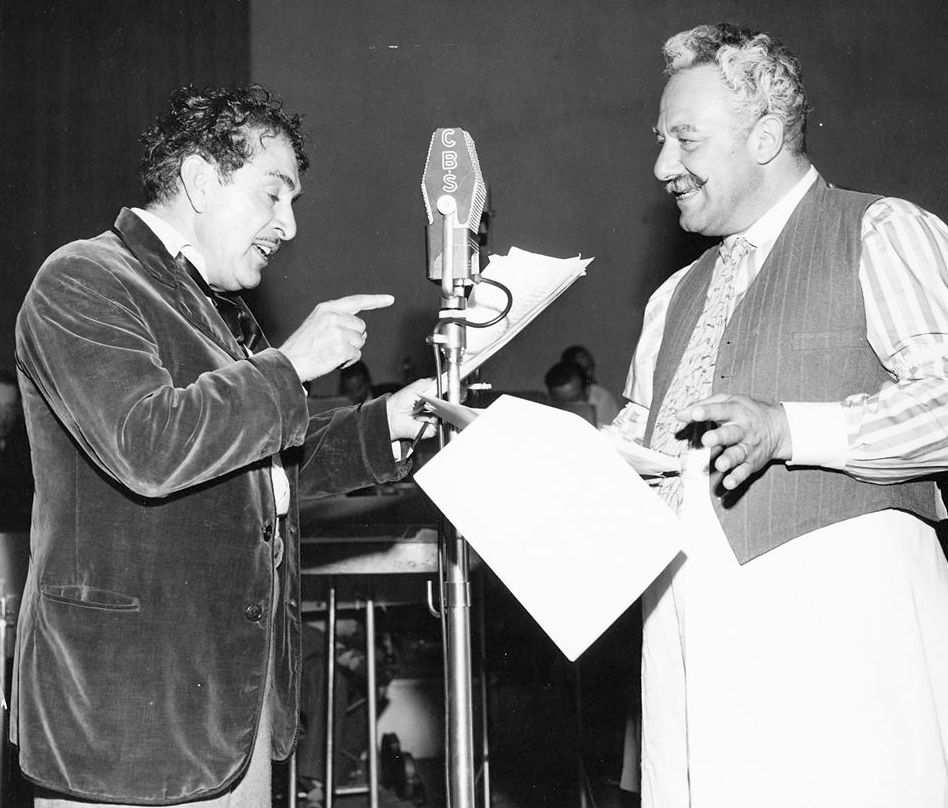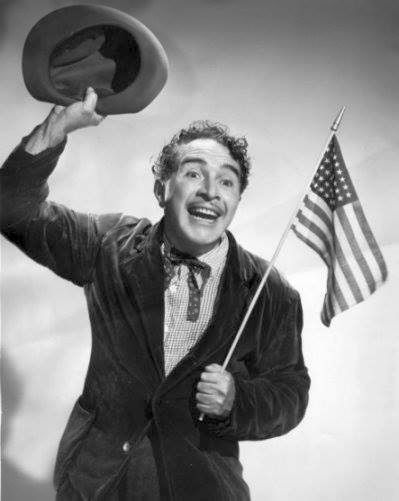“Atsa funny thing—when I’m-a say it, itsa come out different…”
Posted by Ivan G. Shreve, Jr. on Sep 21st 2017
Describing himself at one time as “a reformed introvert,’ writer Cy Howard decided to get into radio after quitting a $70-a-week position as a salesman in Chicago. He had a taste of success in that arena, working briefly as a scribe for Jack Benny, and upon being hired by CBS as a staff writer contributed gags to the likes of Milton Berle and Danny Thomas. His idea for a situation comedy about two young women living and working in New York would hit the airwaves in April of 1947, and became a smash hit: My Friend Irma. In show business, nothing succeeds like success…and Howard soon followed up Irma with another popular radio comedy series that premiered over CBS on this date in 1948. He used his familiar Chicago environs as the setting for a show that chronicled a newly-arrived immigrant’s heartwarming attempts to adjust to his adopted country: Life with Luigi.
Life with Luigi began as a June 15, 1948 audition record originally titled “The Little Immigrant.” The concept of the series was that Luigi Basco (J. Carrol Naish), an Italian émigré, sets up an antique shop at 21 North Halstead in the Little Italy section of the Windy City. Luigi’s arrival in the U.S. was free of difficulty thanks to his sponsor/benefactor Pasquale (Alan Reed), a restauranteur who leased the space that housed Luigi’s burgeoning antique shop. Pasquale was the proprietor of The Spaghetti Palace, an Italian bistro adjacent to Luigi’s business, and had paid for Luigi’s boat passage to his new country in the spirit of friendship.

Okay…that last part isn’t completely on the level. Not to put too fine a point on it, Pasquale schemed in the manner of an Italian “Kingfish” and he had an ulterior motive: to marry off his hefty daughter Rosa (who tipped the scales at 300 lbs. soaking wet) to Luigi and become Mr. Basco’s father-in-law. Much as My Friend Irma had a running gag with Al phoning his friend Joe for advice (“Hello, Joe? Al. Got a problem…”), Life with Luigi milked audience laughter with the anticipated entrance of Rosa on the program every week. “Just so happen I’m-a bring-a my little baby with-a me…I’m-a gonna call her over,” Pasquale would declare. “Oh Rooosssa…Rooosssa…ROSA!” A squeaky-voiced female (portrayed by actress Jody Gilbert) would then reply: “You call me, Papa?”
“Say ‘allo to Luigi,” her father would prompt, and Rosa would respond with the boisterous laugh of a more-than-amply-proportioned gal before adding a high-pitched “Hello, Luigi!” “Hello, Rosa,” Luigi would reply with all the enthusiasm of a husband beaten down by years of marriage (despite Luigi’s determined bachelorhood). It was one of those moments that fans of the show came to anticipate weekly, and though it’s a bit repetitious when one listens to several Luigi shows back-to-back, occasional attempts were made to “shake it up” as evidenced in this exchange from a March 27, 1949 broadcast:
PASQUALE: Heh heh heh…where-a you think? I’m-a gotta just the
girl…she also happens to be passin’-a by…
ROSA: Papa, you want me?
PASQUALE: Not-a yet! Wait ‘til I call-a you… (calls) Rooosssa…
ROSA: Now?
PASQUALE: No! (again) Rooosssa…
ROSA: Now?
PASQUALE: No! Canna you play hard to get? (third time) ROSA!
ROSA: Yes, Papa?
PASQUALE: Rosa—say ‘allo to Luigi…
ROSA (giggling): Hello Luigi!
LUIGI (resigned to his fate): Hello, Rosa…

The Life with Luigi broadcasts were framed around a weekly letter written by Luigi to his mother (“Dear Mamma Mia…”), as the character would relate his misadventures in the New World. Many of the comic situations were derived from the main character’s determination to assimilate and become an American citizen. To that end, he attended night classes to prepare him for citizenship test. The class was taught by Miss Spaulding (Mary Shipp), on whom Luigi had a slight crush. His fellow students were a melting pot that included Scandinavian Olsen (Ken Peters), Russian Jew Horowitz (Joe Forte), and a cantankerous German named Schultz, whose frequent complaint of “My rheumatism is killing me” also became a popular catchphrase. Schultz was played by Hans Conried, who was already working for creator Howard on My Friend Irma as Professor Kropotkin; Alan Reed was also an Irma regular (he played Irma’s boss, Mr. Clyde). There was quite a bit of cast crossover—in fact, when Cathy Lewis left Irma in its last radio season, Luigi’s Mary Shipp joined the Irma cast as Irma’s new roommate, Kay Foster.
Audiences soon fell in love with Luigi, and during its six-year-run on CBS (from 1948 to 1954) the series often gave its competition—Bob Hope on NBC—a run for its money. The show later transitioned to television with much of its radio cast intact; the only exception being Conried, whose Schultz was played by Sig Ruman for the small screen version. The TV Luigi didn’t enjoy the success of its radio counterpart; after its premiere on September 22, 1952 it lasted just three months before being cancelled due to sponsor concerns about its ethnic stereotypes. Actor Alan Reed reminisced in a 1975 interview with radio historian Chuck Schaden that the show’s cancellation was connected to Jody Gilbert’s testimony before HUAC due to her political affiliations. However, his memory was clouded by the fact that CBS resurrected the TV Luigi in April of 1953 with Vito Scotti, Thomas Gomez, and Muriel Landers in the Luigi, Pasquale, and Rosa roles. It mattered very little; the TV Life with Luigi made its final bow in June of 1953…a few months after the radio incarnation called it quits in early March. (Life with Luigi made a brief reappearance on radio in 1954 in a fifteen-minute strip-show format…and then closed the antique shop permanently.)

One of radio’s surefire laugh-getting devices was dialect comedy and the exaggeration of ethnic stereotypes; as author Fred MacDonald wrote in Don’t Touch That Dial!: “Some of the most important series in radio history, in fact, exploited ethnic humor.” (Amos ‘n’ Andy, The Goldbergs, Lum and Abner…just to name a few.) Though Life with Luigi can seem controversial in these more enlightened times, there’s never any real malice in its presentation…besides, it allows listeners to enjoy Alan Reed in his funniest radio role (Pasquale is a great comic villain) not to mention Hans Conried (always sensational!) and “that celebrated actor,” J. Carrol Naish—a dialect master despite his Irish origins. Radio Spirits offers an 8-CD collection of classic Life with Luigi broadcasts (including the September 21, 1948 premiere!) and there’s Luigi to be located on our potpourri sets Great Radio Comedy and Radio’s Christmas Celebrations.

